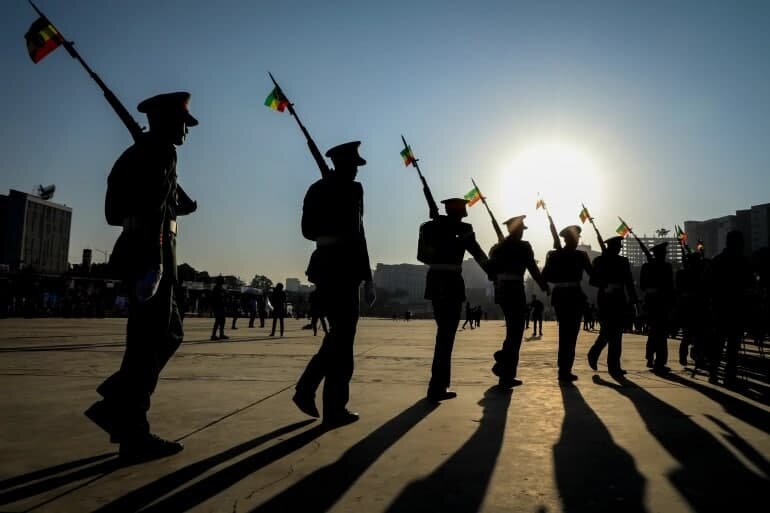Arab allies of Israel should learn a lesson from Ethiopia

TEHRAN – Ethiopia is back in the spotlight again. But as Ethiopia descends into a devastating civil war, it is worth putting the focus on the regional dynamics affecting developments in the Horn of African country and what lessons can de be drawn for some countries in the West Asia region.
A senior United Nations official has recently warned of Ethiopia plunging into a civil war as conflict raging on between the central government and a peripheral ethno-political group called the Tigray People’s Liberation Front (TPLF). The conflict erupted a year ago when the Ethiopian government led by Prime Minister Abiy Ahmed sought to take a step in the direction of nation-building.
In 2019, the prime minister merged many ethnic- and region-based political parties into his unified Prosperity Party in a bid to establish a powerful centralized government and put an end to ethnic federalism fomenting ethnic nationalism in the face of the central government.
But the move backfired, with the TPLF, having enjoyed a strong position as the dominant political party in Ethiopia for over two decades, refusing to fall under the influence of the prime minister’s party.
The early clashes happened in the Tigray region, the traditional stronghold of the TPLF, after it held a regional election that was rejected by the central government. The election in Tigray was held after the Abiy Ahmed government postponed a general election that was to be held in August 2020.
It was then when the two sides declared each other as illegitimate leaders. Clashes between the TPLF and the central government began on November 3, 2020. By the end of the month, the central government took over Mekelle, the capital of the Tigray Region.
In the beginning, it seemed that the Ahmed government was finally achieving its goal of eliminating the TPLF and ending ethnic politics. Ahmed declared the Tigray operation over after capturing Mekelle.
But in June 2021, the tide started to turn in the favor of the Tigrayans, with the TPLF retaking Mekelle and starting to even conquest other regions. The TPLF, together with its allies from other Ethiopian ethnic groups particularly the Oromo Liberation Army (OLA), is now spearheading a campaign to take the Ethiopian capital Addis Ababa.
The rebels’ advances toward the capital prompted Ahmed to declare a state of emergency and call on civilians to take up arms to defend the capital.
United Nations Under-Secretary-General for Political and Peacebuilding Affairs Rosemary A. DiCarlo has said that Ethiopia is descending into civil war as world media reported ethnic violence across the country.
Expressing deep concerns over the war in Ethiopia, DiCarlo told the UN Security Council that “What is certain is that the risk of Ethiopia descending into a widening civil war is only too real. That would bring about a humanitarian catastrophe and consume the future of such an important country.”
It seems that Abiy Ahmed finds himself and his government increasingly alone and isolated in the face of the rebels who are now marching toward the capital. Even his one-time friends in Israel let him down, refusing to supply him with weapons needed to fend off the attack of the Tigrayans.
Israel has been the main supplier of weaponry to the army of the Ethiopian central government. In July 2019, two Israeli firms, Israeli Aerospace Industries (IAI) and Rafael Advanced Defense Systems, installed an intermediate-range air defense system called Spyder-MR near the controversial Renaissance Dam on the Nile River, which strained Ethiopia’s relations with Egypt and Sudan.
Facing mounting military pressure from the Tigrayans, Ahmed sought military help from Israel. But the Israelis refused to come to his rescue in times of crisis, prompting the prime minister to cool relations with Israel.
DEBKAfile, an Israeli news website with close ties to intelligence circles in Tel Aviv, wrote, “Of late PM Ahmed cooled the relationship when Israel refused to sell his government kamikaze drones for halting the rebels’ advance – despite being his army’s main supplier of weaponry.”
This should be a wake-up call for all Arab countries forming security alliances with Israel in the hope of relying on it in times of difficulty. Israel did not hesitate to abandon Ahmed. And it won’t hesitate in leaving its new Arab allies in the Persian Gulf region to their fate in times of difficulty.
Even worse, Israel has forged ties with Ahmed’s rivals while working with him. “Israel and the Tigrayans have engaged in contacts in the past,” the Israeli website wrote.
Ahmed has complained about the Israeli role in the Ethiopian war only recently. Israel has brought in dozens of Ethiopian Jews secretly. Ahmed complained directly to Israel Prime Minister Naftali Bennett that some of them were officers involved in war crimes in the Tigray region.
This is another lesson for the Arab states currently embracing Israel that Tel Aviv may work with and even assist them in certain issues but this does not mean that Israel won’t stab them in the back.
